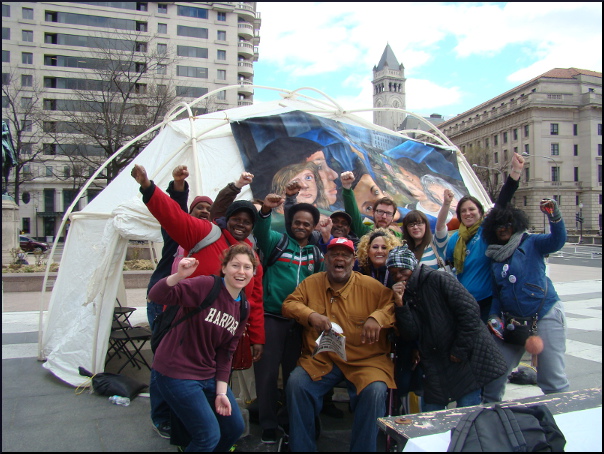
The National Day of Action for Housing took place this year on April 1, and was covered for Austin’s American Statesman by Elizabeth Findell on the front page of the Metro section. (The picture on this page is by Sue Watlov Phillips, in Washington DC.)
In Austin, a group of awareness-raisers carried signs and serenaded shoppers and diners along South Congress Avenue, bowing after their chants concerning affordable housing. They shook some hands, and passed out flyers explaining how 25 cities, including Washington, D.C., joined in holding rallies and teach-ins on the day.
Philosophical underpinnings
Speaking of Washington, many concerned people have noticed that among all the verbiage proceeding from the nation’s capital since the new administration moved in, the word “homelessness” has been notably absent. Yet this is a huge and horrible domestic issue. When coupled with other current trends, like defunding health care and de-staffing the VA and releasing police forces from their already scanty restraints, homelessness just might get worse before it gets better.
We tend to naively assume that the taxes we pay will take care of all this stuff. Yes, we are correct in believing that those funds ought to be used to alleviate societal problems like hunger, homelessness, sickness, ignorance, and so forth.
But… We have to face the fact that this is not happening to anywhere near the extent that it should. The dollars we put into the system are not being converted into help for the people in desperate need. The awful truth is that we are all called upon to make more contributions of money, time, attention, self-education, and compassion. It’s the only way we will make it through these times.
Back to Austin
The Statesman website offers a slide show of a dozen photos of the event. Attendees included The Challenger Street Newspaper journalist Jennifer Gesche in a mechanical wheelchair. Many of the participants were individuals suffering from traumatic brain injury (TBI) or chronic traumatic encephalopathy (CTE), and House the Homeless President Richard R. Troxell has been working with them to secure disability benefits, successfully in seven cases so far, with four more still in progress.
Richard says:
I explained to the guys that they were Ambassadors for all the other homeless folks who could not be with us today, and to smile. Before they knew it, they were smiling for real. People could feel our power and sincerity. Everyone had a good old time, with warm feeling all around. They felt appreciated and cared about. Some told me they ended the day with hope…
House the Homeless has many messages, including the suggestion that Austin needs a workers’ hotel, a single-room occupancy establishment with shared facilities to keep the rent really low. A higher minimum wage would help, as well as more reasonable rental options.
Predictably, in the Statesman‘s comment section, someone asked, “Why don’t the homeless get a job?” This person obviously skipped the paragraph that reports, “Troxell said about half of the nation’s homeless people spend at least part of each week working.”
As always, House the Homeless urges people to learn about and support the Universal Living Wage, the idea whose time has come; the concept to prevent homelessness at its core. Call up the page and see how employers actually save money by paying a living wage — how, in fact, a living wage is good for not only for workers, but also for business owners.
How easy it is for an employer to have a team of valuable assets rather than reluctant, resentful workers who feel exploited and unappreciated! “With a long-term crew of capable workers, training costs are reduced, and experienced employees make fewer dangerous and expensive mistakes. There is less unscheduled absenteeism, and appreciably less internal theft,” Richard says, and a great many other eminently sensible things besides.
We also recommend his white paper, “Livable Incomes: Real Solutions that Stimulate the Economy.” For in-depth information about all these topics and more, please see Richard’s book, Looking Up at the Bottom Line. It chronicles an amazing array of activism, explains why many things in America do not work quite as they should, and offers numerous excellent ideas for fixing those things.
Demonstrate on Tuesday, April 18
If employers paid a fair living wage, the taxpayers would not be called upon to share so much of the burden of need. For instance, if employers paid a fair living wage, at least some fraction of people who now need food stamps would not, and, of course, people who are now homeless would be able to get themselves under roofs. Not all of them — but at least some. And that would be a vast improvement over the situation as it now stands.
To get fired up, see Richard’s 2011 Tax Day appeal. Make some signs and banners and get on down to your local post office to make a show, and remember:
Livable Incomes are the Gateway to Affordable Housing. — Richard R. Troxell
Reactions?
Source: “‘Mighty homeless’ serenade South Austin diners in advocacy effort,” MyStatesman.com, 04/01/17
Image: National Day of Action Group Cheer by Sue Watlov Phillips


